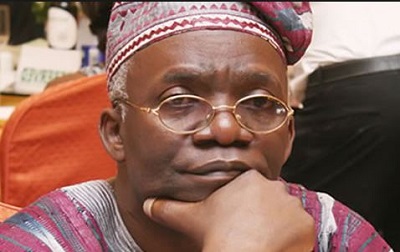
Human rights lawyer, Femi Falana (SAN), has predicted that Atiku
Abubakar, the Peoples Democratic Party (PDP) presidential candidate in
the February 23 election, will face “insurmountable legal obstacles” at
the Presidential Election Petition’s Tribunal.
Falana in a statement on Tuesday, however, warned that Atiku should
not be blackmailed not to take the legal step, adding that the calls
prevailing on him not to approach the tribunal were uncalled for.
He recalled that President Muhammadu Buhari who was declared the
winner of the February 23 election, had challenged his losses in court
in the successive presidential elections of 2003, 2007 and 2011.
Falana, however, stated that the failure of successive
administrations to reform the electoral process, had created
insurmountable legal obstacles for election petitioners.
“The campaign that Alhaji Atiku Abubakar should not seek redress is totally uncalled for.
“Aggrieved by the general elections of 2003, 2007 and 2011
conducted by INEC, Candidate Muhammadu Buhari sought redress in court.
“The chairman of the APC, Adams Oshiomole and other APC leaders have had cause to claim their mandate through the court.
“Even some APC members who lost the just-concluded National
Assembly elections have announced plans to challenge the return of their
opponents by INEC.
“Therefore, Alhaji Atiku Abubakar should not be blackmailed or
begged by any group of people not to challenge the presidential election
held in the country on February 23, 2019.
“Regrettably, however, the failure of the PDP and APC-led
Federal Government to reform the electoral process has created
insurmountable legal obstacles for election petitioners,” he said.
Falana added that “the frustration of election petitioners has
been compounded by several judicial authorities”, with some decisions
holding that “an election cannot be questioned on grounds of corrupt
practices.
“For instance, a petitioner is required to prove that there is
substantial non-compliance and that the non-compliance has substantially
affected the results of the election.
“In Yussuf v Obasanjo, it was held that an election cannot be questioned on grounds of corrupt practices.
“In Falae v Obasanjo it was held that it has to be proved that financial inducement was authorised by the winner of an election.
“In Buhari v Obasanjo it was held that the onus of proving electoral malpractice rests on the petitioner.
“Several fraudulent elections have been upheld under the doctrine of substantial compliance.
“In several cases, winners of fraudulent elections that were
annulled were allowed to take part in rerun elections ordered by the
courts.”



















0 comments:
Post a Comment